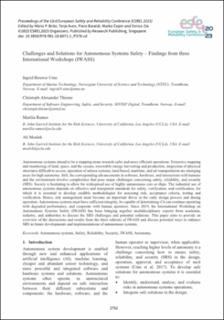Challenges and Solutions for Autonomous Systems Safety–Findings from three International Workshops (IWASS)
Chapter
Published version
Permanent lenke
https://hdl.handle.net/11250/3115452Utgivelsesdato
2023Metadata
Vis full innførselSamlinger
- Institutt for marin teknikk [3400]
- Publikasjoner fra CRIStin - NTNU [37228]
Originalversjon
10.3850/978-981-18-8071-1_P378-cdSammendrag
Autonomous systems intend to be a stepping-stone towards safer and more efficient operations. Extensive mapping and monitoring of land, space, and the oceans, renewable energy harvesting and production, inspection of physical structures difficult to access, operation of subsea systems, land-based, maritime, and air transportation are emerging areas for high autonomy. Still, the corresponding advancements in software, hardware, and interactions with humans and the environment involve complexities that pose major challenges concerning safety, reliability, and security (SRS). Society is hesitating to allow for widespread use of highly autonomous cars or ships. The industrial use of autonomous systems depends on effective and transparent standards for safety, verification, and certification, for which it is essential to develop credible methodologies for assessing risk, acceptance criteria, testing and verification. Hence, risk management must become an important driver in the early design process and during operation. Autonomous systems must have sufficient integrity, be capable of determining if it can continue operating with degraded performance, and cooperate with human operators. Since 2019, the International Workshop on Autonomous Systems Safety (IWASS) has been bringing together multidisciplinary experts from academia, industry, and authorities to discuss the SRS challenges and potential solutions. This paper aims to provide an overview of the discussions and results from the three editions of IWASS and discuss potential ways to enhance SRS in future developments and implementations of autonomous systems.
